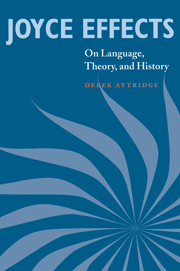Book contents
- Frontmatter
- Contents
- Acknowledgments
- References and abbreviations
- Preface
- Introduction: On being a Joycean
- Chapter 1 Deconstructive criticism of Joyce
- Chapter 2 Popular Joyce?
- Chapter 3 Touching ‘Clay’: reference and reality in Dubliners
- Chapter 4 Joyce and the ideology of character
- Chapter 5 ‘Suck was a queer word’: language, sex, and the remainder in A Portrait of the Artist as a Young Man
- Chapter 6 Joyce, Jameson, and the text of history
- Chapter 7 Wakean history: not yet
- Chapter 8 Molly's flow: the writing of ‘Penelope’ and the question of women's language
- Chapter 9 The postmodernity of Joyce: chance, coincidence, and the reader
- Chapter 10 Countlessness of livestories: narrativity in Finnegans Wake
- Chapter 11 Finnegans awake, or the dream of interpretation
- Chapter 12 The Wake's confounded language
- Chapter 13 Envoi: judging Joyce
- Works cited
- Index
Chapter 12 - The Wake's confounded language
Published online by Cambridge University Press: 22 September 2009
- Frontmatter
- Contents
- Acknowledgments
- References and abbreviations
- Preface
- Introduction: On being a Joycean
- Chapter 1 Deconstructive criticism of Joyce
- Chapter 2 Popular Joyce?
- Chapter 3 Touching ‘Clay’: reference and reality in Dubliners
- Chapter 4 Joyce and the ideology of character
- Chapter 5 ‘Suck was a queer word’: language, sex, and the remainder in A Portrait of the Artist as a Young Man
- Chapter 6 Joyce, Jameson, and the text of history
- Chapter 7 Wakean history: not yet
- Chapter 8 Molly's flow: the writing of ‘Penelope’ and the question of women's language
- Chapter 9 The postmodernity of Joyce: chance, coincidence, and the reader
- Chapter 10 Countlessness of livestories: narrativity in Finnegans Wake
- Chapter 11 Finnegans awake, or the dream of interpretation
- Chapter 12 The Wake's confounded language
- Chapter 13 Envoi: judging Joyce
- Works cited
- Index
Summary
This talk was given at the 1986 James Joyce Symposium in Copenhagen, in a panel entitled ‘Finnegans Wake and the Language of Babel’.
Not far from the venue of the Tenth International James Joyce Symposium is a church, Vor Frelsers Kirke, with a superb eighteenth-century spire, so constructed that around the outside of it a stair spirals disconcertingly to the top. There is no truth, my guidebook reassures me while inviting me to make the ascent (‘in good weather only’), in the legend that the builder fell to an untimely death from his newly completed but not entirely stable tower. But if the story is untrue, how has it gained suffcient currency to merit an official denial in a guidebook? And why,in any case, should a guidebook, whose function is to enhance my pleasure by giving me facts about the objects I see, waste its space with a legend I am told to dismiss as false?
Evidently, the story of the hapless builder, irrespective of its historical accuracy, has a vivid appeal which strongly colours the sightseer's experience of the fantastic spire – an appeal that springs no doubt from its connection with the wide-ranging family of mythic and literary texts that work and rework the motif of the building of the tower and the consequent fall. (Leaving James Joyce out of it for the moment, three texts we might think of are the eleventh chapter of Genesis, Ibsen's play The Master Builder, and the ballad of Tim Finnegan.)
- Type
- Chapter
- Information
- Joyce EffectsOn Language, Theory, and History, pp. 156 - 162Publisher: Cambridge University PressPrint publication year: 2000



